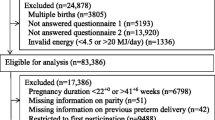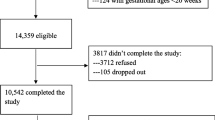Abstract
We examined the association between exposure to seafood intake during two periods of pregnancy on the one hand and risks of preterm delivery and postterm delivery on the other. In a prospective cohort of 8729 pregnant Danish women, we assessed frequency of fish meals during the first and second trimester of pregnancy by questionnaires completed around gestation weeks 16 and 30, respectively. When fish intake was based solely on intake reported for the early period of pregnancy, mean gestation length was shorter by 3.91 (95% CI: 2.24–5.58) days and odds of preterm delivery were increased 2.38 (1.23–4.61) times in those who never consumed fish (n = 308) vs. those who consumed both fish as main meal and fish in sandwiches at least once per week (n = 785). These measures were similar when fish intake was based solely on intake reported for mid-pregnancy. In the subgroup of women reporting same intake in the two trimesters, those who never consumed fish (n = 165) had 8.57 (5.46–11.7) days shorter mean gestation and 19.6 (2.32–165) times increased odds of preterm delivery, compared to high fish consumers (n = 127); odds of elective and postterm delivery were reduced by a factor 0.33 (0.11–1.02) and 0.34 (0.12–0.95), respectively, in zero fish consumers. All analyses were adjusted for potential confounding by factors such as maternal smoking, height, and prepregnant weight. We conclude that never consuming fish in the first two trimesters of pregnancy was an extremely strong risk factor for preterm delivery but was also associated with reduced risks of elective delivery and postterm delivery.
Similar content being viewed by others
References
Clinical Obstetrics and Gynecology 2004; 47(4)
Alberman E (1991) Are our babies becoming bigger? J R Soc Med 84:257–260
Pless IB, Power C, Alberman E, et al. (1994) The Epidemiology of Childhood Disorders (chapter 1–4, 17–18) New York: Oxford University Press
Ingemarsson I, Kallen K (1997) Stillbirths and rate of neonatal deaths in 76,761 postterm pregnancies in Sweden, 1982–1991: a register study. Acta Obstet Gynecol Scand 76(7):658–662
Olsen SF, Hansen HS, Sorensen TI, et al. (1986) Intake of marine fat, rich in (n-3)-polyunsaturated fatty acids, may increase birthweight by prolonging gestation Lancet 2(8503):367–369
Baguma-Nibasheka M, Brenna JT, Nathanielsz PW (1999) Delay of preterm delivery in sheep by omega-3 long-chain polyunsaturates Biol Reprod 60:698–701
Olsen SF, Secher NJ, Bjornsson S, Weber T, Atke A (2003) The potential benefits of using fish oil in relation to preterm labor: the case for a randomized controlled trial? Acta Obstet Gynecol Scand 82(11):978–982
Olsen SF, Sorensen JD, Secher NJ, et al. (1992) Randomised controlled trial of effect of fish-oil supplementation on pregnancy duration Lancet 339:1003–1007
Olsen SF, Secher NJ, Tabor A, Weber T, Walker JJ, Gluud C (2000) Randomised clinical trials of fish oil supplementation in high risk pregnancies Fish Oil Trials In Pregnancy (FOTIP) Team Br J Obstet Gynaecol 107(3):382–395
Smuts CM, Huang M, Mundy D, Plasse T, Major S, Carlson SE (2003) A randomized trial of docosahexaenoic acid supplementation during the third trimester of pregnancy Obstet Gynecol 101(3):469–479
Onwude JL, Lilford RJ, Hjartardottir H, Staines A, Tuffnell D (1995) A randomised double blind placebo controlled trial of fish oil in high risk pregnancy Br J Obstet Gynaecol 102:95–100
Bulstra-Ramakers MT, Huisjes HJ, Visser GH (1995) The effects of 3g eicosapentaenoic acid daily on recurrence of intrauterine growth retardation and pregnancy induced hypertension Br J Obstet Gynaecol 102:123–126
Helland IB, Saugstad OD, Smith L, et al. (2001) Similar effects on infants of n-3 and n-6 fatty acids supplementation to pregnant and lactating women Pediatrics 108(5):E82
Knudsen VK, Hansen HS, Østerdal ML, Mikkelsen TB, Mu H, Olsen SF. Fish oil in various doses and flax oil in pregnancy and timing of spontaneous delivery: a randomised controlled trial. Br J Obstet Gynaecol 2006 May; 113(5): 536–543
Olsen SF (2004) Is supplementation with marine omega-3 fatty acids during pregnancy a useful tool in the prevention of preterm birth? Clin Obstet Gynecol 47(4):768–774
Olsen SF, Hansen HS, Sommer S, et al. (1991) Gestational age in relation to marine n-3 fatty acids in maternal erythrocytes: a study of women in the Faroe Islands and Denmark Am J Obstet Gynecol 164:1203–1209
Olsen SF, Secher NJ (2002) Low consumption of seafood in early pregnancy as a risk factor for preterm delivery: prospective cohort study Br Med J 324(7335):447
Olsen SF (1994) Further on the association between retarded foetal growth and adult cardiovascular disease. Could low intake of marine diets be a common cause? J Clin Epidemiol 47(5):565–569
Olsen SF, Hansen HS, Secher NJ, Jensen B, Sandström B (1995) Gestation length and birth weight in relation to intake of marine n-3 fatty acids Br J Nutr 73(3):397–404
Bjerregaard P, Hansen JC (1996) Effects of smoking and marine diet on birthweight in Greenland Arctic Med Res 55:156–64
Rogers I, Emmett P, Ness A, Golding J (2004) Maternal fish intake in late pregnancy and the frequency of low birth weight and intrauterine growth retardation in a cohort of British infants J Epidemiol Commun Health 58(6):486–492
Thorsdottir I, Gunnarsson BS, Atladottir H, Michaelsen KF, Palsson G (2003) Iron status at 12 months of age – effects of body size, growth and diet in a population with high birth weight Eur J Clin Nutr 57(4):505–513
Oken E, Kleinman KP, Olsen SF, Rich-Edwards JW, Gillman MW (2004) Associations of seafood and elongated n-3 fatty acid intake with fetal growth and length of gestation: results from a US pregnancy cohort Am J Epidemiol 160(8):774–783
Thorsdottir I, Birgisdottir BE, Halldorsdottir S, Geirsson RT (2004) Association of fish and fish liver oil intake in pregnancy with infant size at birth among women of normal weight before pregnancy in a fishing community Am J Epidemiol 160(5):460–465
Kesmodel U, Olsen SF, Secher NJ (2000) Does alcohol increase the risk of preterm delivery? Epidemiology 11(5):512–518
Olsen SF, Hansen HS, Sandström M, Jensen B (1995) Erythrocyte levels compared with reported dietary intake of marine n-3 fatty acids in pregnant women Br J Nutr 73(3):387–395
Smith GC (2001) Use of time to event analysis to estimate the normal duration of human pregnancy Hum Reprod 16(7):1497–1500
Phillips AN, Smith GD (1993) The design of prospective epidemiological studies: more subjects or better measurements? J Clin Epidemiol 46(10):1203–1211
Grandjean P, Weihe P, White RF, et al. (1997) Cognitive deficit in 7-year-old children with prenatal exposure to methylmercury Neurotoxicol Teratol 19:417–428
Acknowledgements
We acknowledge support from March of Dimes Births Defects Foundation, Danish Health Research Foundation, Egmont Fonden, Novo Nordisk Forskningsfond, Aage-Louis Hansens Fond, and Danish National Research Foundation.
Author information
Authors and Affiliations
Corresponding author
Rights and permissions
About this article
Cite this article
Olsen, S.F., Østerdal, M.L., Salvig, J.D. et al. Duration of pregnancy in relation to seafood intake during early and mid pregnancy: prospective cohort. Eur J Epidemiol 21, 749–758 (2006). https://doi.org/10.1007/s10654-006-9053-6
Received:
Accepted:
Published:
Issue Date:
DOI: https://doi.org/10.1007/s10654-006-9053-6




